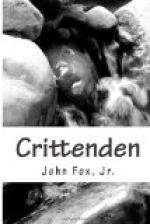that with the passing of the war his occupation had
forever gone. And all at once, out on his ancestral
farm that had carried its name Canewood down from
pioneer days; that had never been owned by a white
man who was not a Crittenden; that was isolated, and
had its slaves and the children of those slaves still
as servants; that still clung rigidly to old traditions—social,
agricultural, and patriarchal—out there
Crittenden found himself one day alone. His friends—even
the boy, his brother—had caught the modern
trend of things quicker than he, and most of them
had gone to work—some to law, some as clerks,
railroad men, merchants, civil engineers; some to mining
and speculating in the State’s own rich mountains.
Of course, he had studied law—his type
of Southerner always studies law—and he
tried the practice of it. He had too much self-confidence,
perhaps, based on his own brilliant record as a college
orator, and he never got over the humiliation of losing
his first case, being handled like putty by a small,
black-eyed youth of his own age, who had come from
nowhere and had passed up through a philanthropical
old judge’s office to the dignity, by and by,
of a license of his own. Losing the suit, through
some absurd little technical mistake, Crittenden not
only declined a fee, but paid the judgment against
his client out of his own pocket and went home with
a wound to his foolish, sensitive pride for which there
was no quick cure. A little later, he went to
the mountains, when those wonderful hills first began
to give up their wealth to the world; but the pace
was too swift, competition was too undignified and
greedy, and business was won on too low a plane.
After a year or two of rough life, which helped him
more than he knew, until long afterward, he went home.
Politics he had not yet tried, and politics he was
now persuaded to try. He made a brilliant canvass,
but another element than oratory had crept in as a
new factor in political success. His opponent,
Wharton, the wretched little lawyer who had bested
him once before, bested him now, and the weight of
the last straw fell crushingly. It was no use.
The little touch of magic that makes success seemed
to have been denied him at birth, and, therefore,
deterioration began to set in—the deterioration
that comes from idleness, from energy that gets the
wrong vent, from strong passions that a definite purpose
would have kept under control—and the worse
elements of a nature that, at the bottom, was true
and fine, slowly began to take possession of him as
weeds will take possession of an abandoned field.
But even then nobody took him as seriously as he took himself. So that while he fell just short, in his own eyes, of everything that was worth while; of doing something and being something worth while; believing something that made the next world worth while; or gaining the love of a woman that would have made this life worth while—in the eyes of his own people he was merely sowing his wild oats




